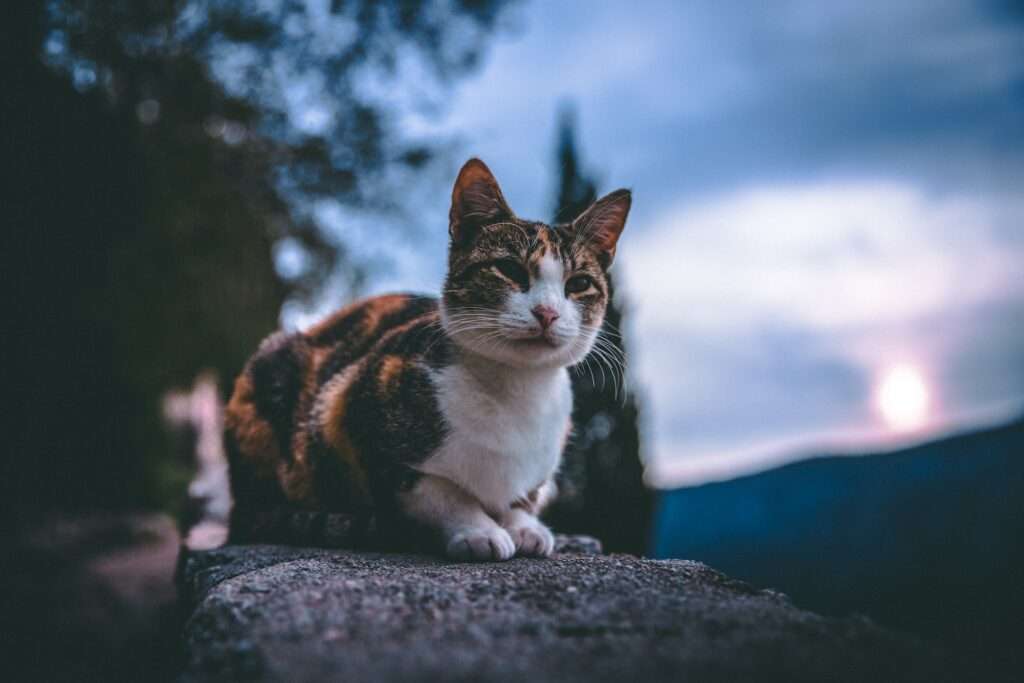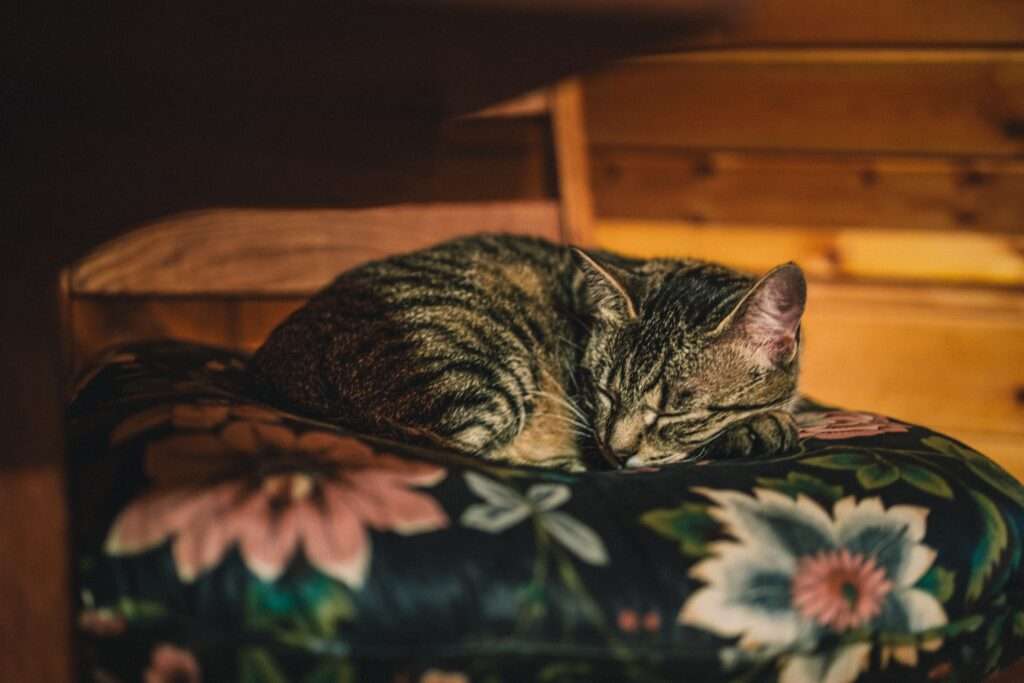Why Does My Cat Meow at Night? Unraveling the Mystery
Do you often find yourself lying in bed, trying to get a good night’s sleep, only to be constantly interrupted by your cat’s persistent meowing? If so, you’re not alone – this is a common issue faced by many cat owners. But have you ever wondered why your furry friend feels the need to vocalize at night?
In this article, we’ll delve into the reasons behind your cat’s nighttime meowing and provide some practical tips on how to tackle this behavior.
Basic Cat Behavior

Cats are intriguing creatures with distinct behaviors and traits that set them apart from other pets. One of their most notable characteristics is their nocturnal nature. As natural hunters, cats have evolved to be more active at night when their prey is most active.
In fact, cats typically sleep for shorter periods during the day so that they can conserve energy for their nighttime hunts. In addition to their hunting instincts, cats are also known for their vocalizations, including meowing. While cats can make a variety of sounds, meowing is typically used to communicate with humans.
Your cat may meow at night for a variety of reasons, such as to get your attention, to demand food or playtime, or simply to express their feelings. Understanding your cat’s behavior and vocalizations can go a long way in helping you address their nighttime meowing.
Health Reasons
If your cat is meowing excessively at night, it could be a sign of an underlying health issue. Cats may meow at night if they are in pain or discomfort, experiencing cognitive dysfunction, or simply hungry or thirsty.
It’s important to pay attention to your cat’s overall health and behavior to determine if there is an underlying issue. If you notice any changes in your cat’s behavior, including nighttime meowing, it’s best to consult with your veterinarian to rule out any potential health concerns.
Environmental Reasons
Changes in the environment can also cause cats to meow at night. If your cat is bored or lonely, they may vocalize to get your attention or to express their need for social interaction. Additionally, if your cat is stressed or anxious, they may meow excessively at night.
Providing adequate environmental enrichment, such as toys, scratching posts, and interactive playtime, can go a long way in keeping your cat mentally stimulated and happy. Additionally, creating a calm and soothing environment for your cat can help reduce stress and anxiety levels.
Behavioral Reasons
In addition to health and environmental factors, there are also behavioral reasons why your cat may meow at night. If your cat has learned that meowing gets them attention or rewards, they may continue to meow excessively at night.
Similarly, if your cat is seeking playtime or demanding food, they may use meowing as a way to communicate their needs. Training your cat to understand appropriate behavior, and providing consistent routines and positive reinforcement, can help address excessive nighttime meowing.
Addressing Nighttime Meowing

Addressing excessive nighttime meowing can be challenging, but there are several strategies that can help. Here are a few tips for addressing nighttime meowing:
- Create a bedtime routine: Cats thrive on routine, so establishing a consistent bedtime routine can help signal to your cat that it’s time to sleep. This could include providing a comfortable sleeping area, offering a bedtime snack, and engaging in calming activities, such as grooming or playtime.
- Provide mental and physical stimulation: Boredom and pent-up energy can contribute to excessive meowing, so it’s important to provide your cat with plenty of mental and physical stimulation during the day. This could include offering interactive toys, puzzle feeders, and scratching posts, as well as setting aside time for play and exercise.
- Ignore attention-seeking behavior: If your cat is meowing excessively for attention, it’s important not to reinforce this behavior by responding or rewarding them. Instead, try ignoring your cat’s meows and providing attention and affection when they are quiet and calm.
Breeds that Meow More at Night
Some cat breeds are known for being more vocal than others, and this includes meowing more at night. Here are a few breeds that are known for their nighttime vocalizations:
- Siamese: Siamese cats are known for being very vocal and often meow loudly and frequently. They are also known for being very social and demanding attention from their owners.
- Bengal: Bengal cats are known for their energetic and playful personalities, but they are also known for being very vocal. They may meow loudly at night to get their owners’ attention or to express their need for playtime or food.
- Oriental Shorthair: Oriental Shorthair cats are similar to Siamese cats in their vocalizations, often meowing loudly and frequently. They are also known for being very active and intelligent, and may meow at night if they are bored or seeking attention.
If you have a cat breed that is known for being more vocal at night, it’s important to provide them with plenty of mental and physical stimulation during the day and establish consistent routines and boundaries to help reduce excessive meowing at night.
Conclusion
In conclusion, there are a variety of reasons why your cat may meow at night, including basic cat behavior, health issues, environmental factors, and behavioral issues. Understanding why your cat is meowing excessively at night is key in addressing the issue and improving the overall well-being of your furry friend.
By providing appropriate health care, environmental enrichment, and consistent routines and training, you can help reduce excessive nighttime meowing and strengthen the bond between you and your cat. Remember, if you are ever concerned about your cat’s behavior or health, consult with your veterinarian for guidance and support.
Frequently Asked Questions
Why does my cat meow at night?
Your cat may meow at night for various reasons. Some common reasons include to get your attention, to demand food or playtime, or simply to express their feelings.
How can I stop my cat from meowing at night?
To stop your cat from meowing at night, you can try giving them more attention and playtime during the day, providing them with enough food and water for the night, and ensuring that their litter box is clean. You can also try ignoring their meows and not giving them attention when they do meow at night.
Is it normal for cats to meow at night?
Yes, it is normal for cats to meow at night. However, excessive meowing at night may be a sign of an underlying issue, such as stress or illness.
What can I do if my cat’s nighttime meowing is due to a health issue?
If your cat’s nighttime meowing is due to a health issue, you should take them to the vet for a check-up. The vet can diagnose and treat any health issues your cat may have.
How can I tell if my cat’s nighttime meowing is due to stress?
Signs that your cat’s nighttime meowing is due to stress may include increased vocalization, pacing, decreased appetite, or changes in grooming habits. If you suspect your cat is stressed, try to identify and eliminate any potential stressors, such as changes in routine or environment.
Should I let my cat sleep with me if they meow at night?
Whether or not you should let your cat sleep with you if they meow at night depends on your personal preferences. If you don’t mind your cat meowing or waking you up at night, then it’s fine to let them sleep with you. However, if you prefer a quiet night’s sleep, you may want to train your cat to sleep in their own bed.
Can cats develop separation anxiety and meow at night as a result?
Yes, cats can develop separation anxiety and meow at night as a result. This may happen if your cat is used to being with you all day and becomes anxious when you’re not around at night. To help alleviate separation anxiety, you can try leaving your cat with comforting items, such as a favorite toy or blanket.
Can cats meow at night due to boredom?
Yes, cats can meow at night due to boredom. If your cat is not getting enough mental or physical stimulation during the day, they may become restless and meow at night. To combat boredom, try providing your cat with interactive toys or playtime during the day.
Is it normal for senior cats to meow at night more frequently?
Yes, it is normal for senior cats to meow at night more frequently. As cats age, they may experience changes in their sleep patterns, which can lead to increased nighttime vocalization. If your senior cat’s meowing at night is excessive or accompanied by other symptoms, such as confusion or disorientation, you should consult your vet.
Case Studies
Real-life case studies can help cat owners better understand the causes and solutions to nighttime meowing. Here are a few examples:
- Sarah’s cat, Luna, started meowing excessively at night after a recent move to a new apartment. After consulting with her veterinarian and making some adjustments to Luna’s environment, such as providing more hiding spots and familiar scents, Luna’s nighttime meowing gradually decreased.
- David’s cat, Max, was meowing loudly and constantly at night, which was causing him to lose sleep. After consulting with a cat behaviorist, David realized that Max was bored and not getting enough playtime during the day. By providing more interactive toys and dedicating more time to playtime and exercise, Max’s nighttime meowing significantly decreased.
- Lisa’s cat, Simba, had always been a vocal cat, but his nighttime meowing had become excessive and disruptive. After ruling out any medical issues, Lisa realized that Simba was meowing for attention and had become accustomed to getting a lot of attention at night. By gradually decreasing attention at night and rewarding quiet behavior, Simba’s nighttime meowing improved.
Additional Resources
If you’re still struggling with your cat’s nighttime meowing, there are plenty of additional resources available to help you. Here are a few options:
- Your veterinarian: Your veterinarian is the first person to consult if you’re concerned about your cat’s nighttime meowing. They can rule out any underlying medical issues and provide advice on behavior modification.
- Cat behaviorist: If your cat’s nighttime meowing is due to behavioral issues, a cat behaviorist can provide more in-depth advice and strategies for modifying your cat’s behavior.
- Online forums: There are plenty of online forums and communities dedicated to cat behavior and care. These can be a great resource for getting advice and support from other cat owners who have gone through similar experiences.
- Cat care books: There are many books available on cat behavior and care, which can provide in-depth advice on addressing nighttime meowing and other behavioral issues.
By using these additional resources, you can better understand your cat’s behavior and develop strategies for addressing their nighttime meowing. Keep in mind that every cat is unique, and what works for one cat may not work for another.
Therefore, finding the right solution for your furry friend may require some trial and error. Don’t be discouraged if the first solution doesn’t work – keep trying until you discover what works best for your cat’s individual needs.





